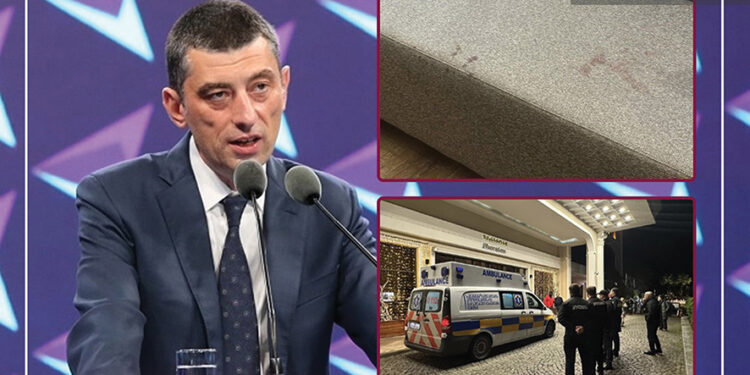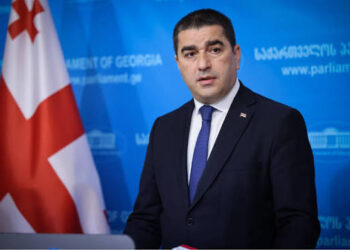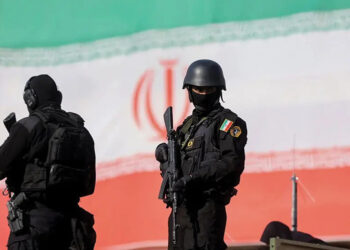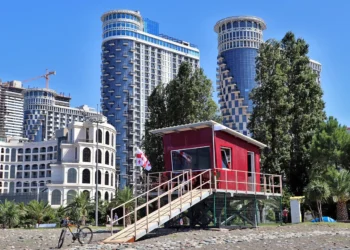Recent days have seen an escalation of violence and political repression in Georgia, with opposition leaders, journalists, and protesters becoming targets of physical attacks and arbitrary detentions. The brutal assault on opposition politician Giorgi Gakharia, former Prime Minister and leader of the ‘For Georgia’ party, along with the detention and mistreatment of journalists and demonstrators, has sparked widespread condemnation both within Georgia and internationally. This surge in state-sanctioned violence has drawn sharp criticism from local civil society organizations, international bodies, and foreign governments, who are calling for accountability and an end to the suppression of fundamental freedoms.
Gakharia’s attack on January 15, in Batumi, which resulted in a fractured nasal bone and a concussion, is the latest in a series of politically motivated assaults. Gakharia was attacked at the Sheraton Hotel by Dimitri Samkharadze, a member of the ruling Georgian Dream party, along with his associates. According to doctors who treated Gakharia, he was conscious upon arrival at the clinic, with stable vital signs, but left the facility on his own after receiving treatment for his injuries.
The ‘For Georgia’ party immediately condemned the attack as an orchestrated assault, accusing the government of using violence to silence opposition voices and intimidate those who oppose the current regime. They also called for an immediate and thorough investigation.
“This brutal attack was a coordinated group assault orchestrated by Ivanishvili’s regime,” the statement read, referring to Bidzina Ivanishvili, the leader of Georgian Dream.
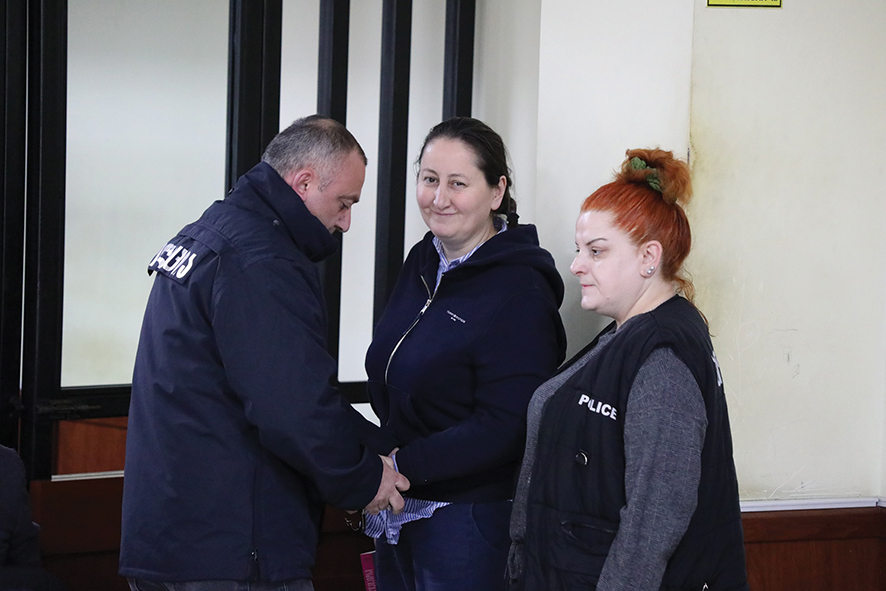
Giorgi Gakharia was in Batumi for a court hearing concerning members of his party’s youth organization, who had been allegedly unjustly persecuted. Party members have publicly expressed outrage at the attack, with one, Natia Mezvrishvili, claiming that the evidence was tampered with at the scene of the assault.
This incident is part of a broader pattern of escalating political violence, with several journalists and protesters also finding themselves targeted by police forces. Mzia Amaghlobeli, founder of the Batumelebi and Netgazeti media outlets, was arrested over the weekend during a protest in Batumi.
Initially detained under administrative law, she was released briefly, only to be re-arrested shortly afterward on charges of assaulting a police officer. The charges against her are widely viewed as politically motivated. Civil society organizations and human rights defenders have raised alarm over her arrest, calling it an attempt to silence a critical voice. Amaghlobeli’s detention has sparked further protests, with journalists, human rights activists, and opposition figures calling for her immediate release.
In parallel, actor Andro Chichinadze, comedian Onise Tskhadadze, and nine others, who were arrested on charges of participating in group violence during protests near the parliament building in Tbilisi at the beginning of December, were told that they would remain in custody. This decision was followed by dissatisfaction from the public present in the courtroom, who shouted “Slaves!” and “Russians!”
This brutal attack was a coordinated group assault orchestrated by Ivanishvili’s regime – For Georgia party
While the lawyers requested that the defendants be released on bail without a preventive measure, Judge Ketevan Jachvadze demanded that all the defendants remain in custody. The defendants have denied the charges brought against them.
President Salome Zurabishvili took to social media to strongly condemn the decision. In her post, Zurabishvili criticized the judicial system for its role in what she described as “group violence” against the citizens of Georgia. She emphasized that the actions of the judiciary could lead to severe consequences, warning, “Slavery will end badly.”
Addressing Judge Jachvadze directly, Zurabishvili expressed her outrage: “Ketevan Jachvadze, it is a shame! No one should forget your name. What you and the entire judicial system are doing is perpetrating group violence against every Georgian citizen. You may not have read Kafka, but at least learn from history,” she wrote.
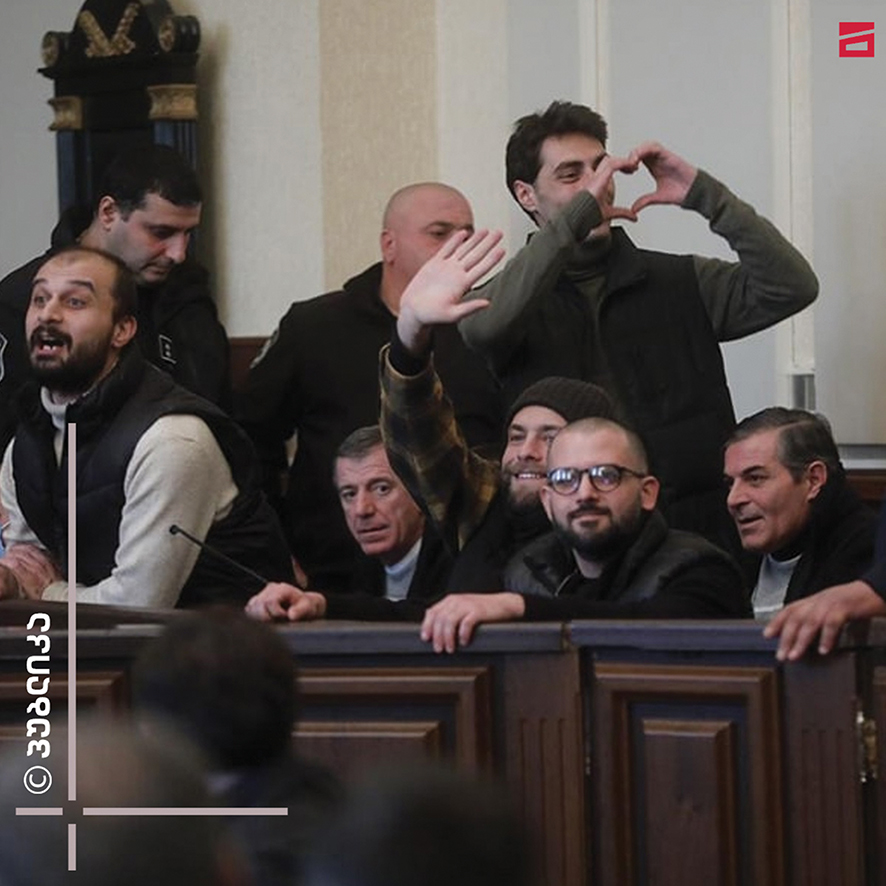
Condemnation for Documented Police Violence and Arbitrary Arrests
Transparency International Georgia (TI Georgia) and the Georgian Young Lawyers’ Association (GYLA) have documented a disturbing pattern of police violence, arbitrary arrests, and mistreatment of detainees during the recent protests in Tbilisi and Batumi. Many of the detained protesters have reported physical and psychological abuse at the hands of the police. One detainee, injured during his arrest, was reportedly denied medical attention. Some detainees have also been restricted from meeting with their lawyers in a timely manner, hindering their access to legal representation. The legal community and NGOs have called for immediate action to ensure the accountability of the police forces involved.
International condemnation has been swift, with various foreign governments and organizations expressing grave concern over the situation in Georgia. The UK, through its Ambassador to Georgia, Gareth Ward, condemned the violence, emphasizing that the Georgian authorities must hold those responsible to account. Ward stressed that, as a member of the Council of Europe, Georgia is obligated to protect its citizens’ fundamental rights. He joined other European partners in denouncing the violence against peaceful protesters, media representatives, and politicians at the Council of Europe, calling for greater protection of fundamental freedoms.
The judicial system is perpetrating group violence against every Georgian citizen – S. Zurabishvili
Meanwhile, international figures such as James MacCleary, a UK Member of Parliament, have proposed sanctions against Georgian Dream officials, specifically targeting Bidzina Ivanishvili for his role in undermining Georgia’s democracy and facilitating Russian interference in the country’s political processes. MacCleary’s motion in the UK Parliament seeks to express deep concern over Georgia’s suspension of its EU accession process and the increasing use of excessive force against peaceful protesters. He called for the UK to take a stronger stance against the Georgian government’s actions, citing the US’s sanctions on Ivanishvili as a model for similar measures by the UK.
The US State Department also condemned the actions of the Georgian government, with spokesperson Matthew Miller expressing concern over the increasing repression of opposition figures and civil society members. Miller noted that the US had already imposed sanctions on Georgian officials and reduced aid to the Georgian government, signaling a firm stance against the erosion of democratic norms in Georgia.
The US Embassy in Tbilisi released the following statement: “The United States condemns the Georgian Dream party’s ongoing violence against Georgian citizens – including opposition leaders, journalists, civil society members, and protestors. Such acts, which appear intended to intimidate Georgians from exercising their fundamental freedoms, do nothing to return Georgia to the Euro-Atlantic path the majority of Georgians want. Georgia deserves better.”
The European Union similarly condemned the recent violence. Anitta Hipper, the Lead European Spokeswoman for EU Foreign Affairs, described the assault on Gakharia and other opposition leaders as shocking. “The reported involvement of Georgian Dream politicians in the brutal attack on former Georgian Prime Minister and opposition leader Giorgi Gakharia is shocking. There is no place for violence or impunity in any democracy – let alone in an EU candidate country,” she said.
In addition to these condemnations, Ukrainian officials have also voiced support for Georgia’s democratic aspirations, denouncing the Georgian government’s actions and emphasizing Ukraine’s solidarity with the Georgian people in their struggle for European integration. Ukrainian Foreign Minister Andrii Sybiha noted Wednesday: “Ukraine stands in solidarity with the Georgian people. We strongly condemn the decision to abandon European integration, denounce the numerous irregularities observed during parliamentary elections, and criticize the excessive repressive actions by Georgian authorities against their citizens. No country, including Russia, has the right to veto a nation’s geopolitical choices or its participation in international organizations and alliances.”
Despite these calls for accountability, the Georgian government has remained defiant. Senior Georgian Dream officials, including Prime Minister Irakli Kobakhidze, have defended the actions of the police, reiterating that any offense against law enforcement officers is a serious crime.
“It is essential for everyone to understand that the police are inviolable, as they represent the authority and strength of the state,” the PM said. “Particularly in the case of high-ranking officers, any action against them is not only entirely unacceptable but also is a very serious criminal offense.” In another statement released Wednesday, Kobakhidze said: “[the Georgian] people expressed their will at the October parliamentary elections…the current political developments in the country are an absolutely feeble performance of the radical opposition.”
The police are inviolable, as they represent the authority and strength of the state – I. Kobakhidze
Kobakhidze’s remarks point to the government’s increasing willingness to use force against its political opponents, while also dismissing concerns from both domestic and international critics.
As the political crisis continues to deepen, Georgia finds itself at a crossroads. With ongoing protests, violence, and arrests, the international community is watching closely to see whether the Georgian government will respond to calls for justice and reform. The future of Georgia’s democracy, its European aspirations, and its commitment to fundamental freedoms hang in the balance as the situation evolves.
By Team GT

